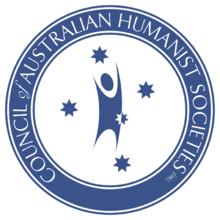This article has multiple issues. Please help improve it or discuss these issues on the talk page. (Learn how and when to remove these template messages)
This article includes a list of references, related reading, or external links, but its sources remain unclear because it lacks inline citations. Please help improve this article by introducing more precise citations. (August 2018) (Learn how and when to remove this message)
This article needs additional citations for verification. Please help improve this article by adding citations to reliable sources. Unsourced material may be challenged and removed.Find sources: "Council of Australian Humanist Societies" – news · newspapers · books · scholar · JSTOR (March 2021) (Learn how and when to remove this message)
This article may rely excessively on sources too closely associated with the subject, potentially preventing the article from being verifiable and neutral. Please help improve it by replacing them with more appropriate citations to reliable, independent, third-party sources. (March 2021) (Learn how and when to remove this message)
(Learn how and when to remove this message)
 | |
| Formation | 1965 |
|---|---|
Region | Australia |
President | Murray Love |
| Affiliations | Humanists International |
| Website | www |
The Council of Australian Humanist Societies (CAHS) is an umbrella organisation for Australian humanist societies.[1] It was founded in 1965.[2] It is affiliated with Humanists International.[3] The official symbol of CAHS (and all member organisations) is the Happy Human.
Activities
[edit]CAHS holds conventions and publishes on humanism.
CAHS accepts Humanist International's Minimum statement on Humanism
[edit]Humanism is a democratic and ethical life stance, which affirms that human beings have the right and responsibility to give meaning and shape to their own lives. It stands for the building of a more humane society through an ethic based on human and other natural values in the spirit of reason and free inquiry through human capabilities. It is not theistic, and it does not accept supernatural views of reality.
See also
[edit]- Agnosticism
- Amsterdam Declaration 2002
- Atheism
- Atheist Foundation of Australia
- Fusion Party (Australia)
- Human rights in Australia
- Humanism and Its Aspirations
- Irreligion in Australia
- Major world religions
- Rationalism
- Rationalist Society of Australia
- Reason Party (Australia)
- Religion in Australia - includes Australian Bureau of Statistics census information relating to religion and belief.
- Secular state
- Secularism
- Separation of church and state in Australia
- Separation of church and state
- States and territories of Australia
- The Secular Party of Australia
References
[edit]- ^ Humanist.org (2018). "THE COUNCIL OF AUSTRALIAN HUMANIST SOCIETIES". Humanism Australia. Retrieved 4 September 2018.
- ^ "Australia's Humanist Societies". Council of Australian Humanist Societies. Retrieved 29 January 2021.
- ^ Ives, Rosslyn (2018). "Free thought activity in Australia: From margins to mainstream". Humanism Australia. Retrieved 4 September 2018.
External links
[edit]- Australian Bureau of Statistics 1996 Census Dictionary – Religion category
- Australian Bureau of Statistics 2001 Census Dictionary – religion category
- Year Book Australia, 2006. Religious Affiliation section from Australian Bureau of Statistics. Much of the text of Religion in Australia is taken from here (or previous versions).
- CAHS website
- ACT Humanist Society website
- Human Rights Brief No. 3 Assessment of international law pertaining to freedom of religion and belief from Australian Human Rights and Equal Opportunity Commission.